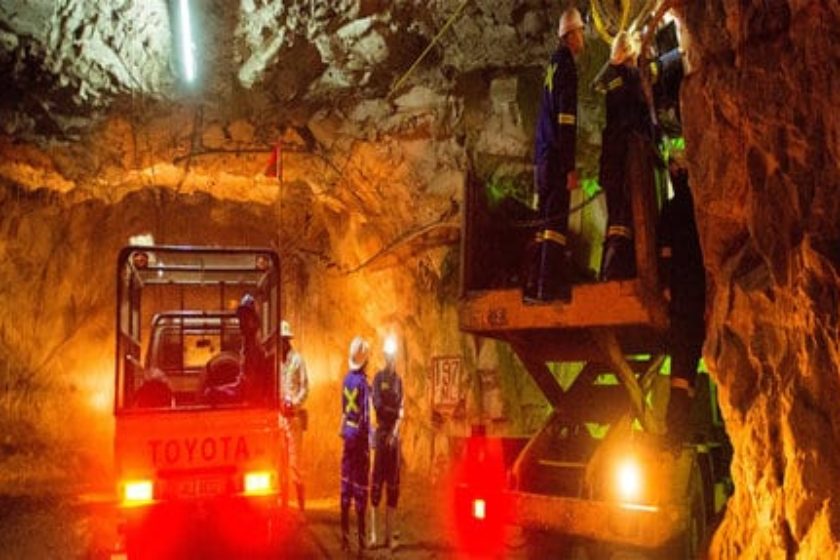It accounts for less than 2% of annual copper production, yet Chibuluma Mine, situated on the Copperbelt, is one of Zambia’s most successful mines in safety, productivity and profitability.
Chibuluma Mine has had “only” one fatality in eight years. Its copper output per employee is 50% higher than the Zambian industry average, and its flagship Chibuluma South project was profitable barely two years after production, which is unusual for the industry. The mine has paid corporate tax every year since 2007, with a total of $112 million paid to date.
Chibuluma is a highly mechanised underground mine just outside Kalulushi, about 22 km from Kitwe. It employs 850 people, about 500 of whom are contractors. The mine produced 13 300 tonnes of copper in 2015 – a fraction of the country’s output of 711 000 tonnes.
Chibuluma was one of the first Zambian mines privatised in 1997. It is 85%-owned by the South African mining company Metorex, a wholly owned subsidiary of China’s Jinchuan Group since 2012.
What accounts for its success?
“We mine one of the highest-grade copper deposits on the Copperbelt,” says chief geologist, Narendra Shekhawat. “That means we do proportionately less work to produce the same amount of copper.”
Although the ore body is not very big, it has an average copper grade of 3%. This contrasts with large open-pit mines such as Barrick Lumwana or FQM’s new Sentinel Mine, where the grade is so low (barely 0.5%) that colossal quantities of ore have to be unearthed and treated, at considerable cost, to extract the copper. Chibuluma’ s smaller operation means not only lower costs but a simpler work set-up – problems are easier to spot and fix, approvals happen faster and turnaround times are shorter.
The mine has none of the frenetic activity characteristic of larger mines. About 600 metres underground, after carefully controlled blasting to expose the ore, a small fleet of only five articulated dump trucks drive up a long winding tunnel and bring the ore to the surface. After crushing and grinding, the ore passes through the small processing plant and emerges as copper concentrate, which is then driven to nearby Chambishi copper smelter and turned into blister copper. Very small quantities of silver are recovered as a by-product during the smelting process –about $16 000 worth a month.
Despite its enviable track record, Chibuluma has not escaped the effects of the current mining downturn. Like Zambia’s other mines, it had to shed workers in 2015, embarked on major cost-cutting and scaled back production. At the height of the copper boom in 2013, Chibuluma produced 18 000 tonnes of copper a year; that is now down to 10 000 tonnes.
“Chibuluma has one of the highest grades of copper on the Copperbelt”
“Reduced production means reduced volumes of ore through our processing plant, so we have a lot of excess capacity,” says Barry Kalumba, Head of Processing.
To maintain processing volumes, Chibuluma is scheduled to start mining a low-grade deposit of 2% at its new Chifupu project. It is also trying to persuade potential new mining ventures in the area to send their ore to Chibuluma for processing, instead of building their own processing plants.
However, the biggest challenge is that the current mineral deposit will be mined out within the next few years.
“Unless our ongoing exploration finds a new copper deposit worth exploiting soon, Chibuluma will probably close sometime between 2020 and 2022,” says Eustus Munsaka, Head of Finance. “All mines have a natural lifespan, and we are about to reach the end of ours.”
Already, a $4.4 million rehabilitation programme is under way to restore the landscape to its original state. Some 33 000 trees have been planted, carpet grass has been laid, and firebreaks have been built. Once the mine stops operating, various structures and buildings will be demolished, roads will be scraped, more land will be replanted with vegetation, and any contaminated land will be neutralised with lime. The entrance to the mine will be sealed to reduce the risk of acid mine drainage.
After closure, the shareholder Metorex and its parent company Jinchuan will shift their focus to the larger copper-mining investments in the neighbouring Democratic Republic of the Congo.
Even though closure is still a few years off, Chibuluma has developed an enviable track record in its contribution to Zambia since it was privatised in 1998. The Mine has paid taxes to government, uplifted the community through its Corporate Social Responsibility programme, and stimulated the local economy and job creation through the spending power of its employees.
Source: Mining for Zambia



